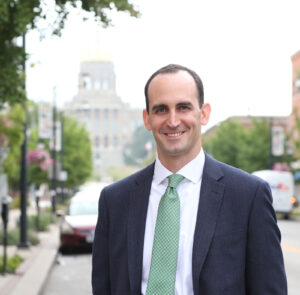Unfavorable domestic economy a top concern in IBC’s third-quarter Economic Outlook Survey
Overall sentiment remains positive as inflation unease wanes

Mike Mendenhall Sep 30, 2024 | 11:21 am
3 min read time
770 wordsAll Latest News, Retail and BusinessConcerns related to an unfavorable domestic economy topped the list of challenges facing Iowa businesses in the results of the Iowa Business Council’s latest six-month Economic Outlook Survey released today.
Iowa business leaders who responded to the third-quarter survey say their overall sentiment for the state’s economy is still positive.
“An unfavorable business climate – national supply chain, infrastructure and federal regulations – and workforce attraction and retention rounded out the top three primary concerns, with both categories being cited by 45% of IBC executives,” the release says.

For the first time since 2021, inflation was not among the top three concerns for IBC members, according to IBC President Joe Murphy. He said the survey could be a sign of less volatility and sentiment “steadying out” after several quarters of swings.
“I think that shows that, yes, while uncertainty is still a very big factor, we’re getting to a point where some of these things are becoming more manageable,” Murphy said.
The report measures IBC member expectations for sales, capital spending and employment for the next six months.
The survey’s overall economic outlook index is 56.67, an increase of 1.41 points from the previous quarter, but down by more than three points from the historical average of 60.38, according to a news release. If the number is over 50, the sentiment is considered positive.
The survey results show three survey categories remaining in positive territory with “low levels of fluctuation across the sub-indexes,” the release says.
Sales expectations increased 2.11 points to reach a level of 60.0. Capital spending expectations increased 2.30 points to a value of 56.2. Employment expectations were essentially flat with a modest 0.2 point decline to a value of 53.75.
“As Iowa continues to navigate constantly changing dynamics in the economy, IBC executives remain positive on future growth opportunities in our state. While employment expectations have cooled for two straight quarters, capital expenditures have rebounded from the second quarter,” Phil Jasper, president of Raytheon and chair of the Iowa Business Council, said in the release.
“The capital expenditure increase is significant as Iowa’s leading business leaders project increasing investments in equipment, technology and other assets to increase growth and opportunity in Iowa despite continued trepidation in the national economy,” Jasper said.
The nonpartisan, nonprofit IBC is made up of 22 chief executives from the state’s largest employers. The IBC has conducted the member poll since 2004.
The survey was conducted before the Federal Reserve voted to lower the U.S. benchmark interest rate by 0.5% on Sept. 18. According to Murphy, although the survey is not predictive of how sentiment may change in the fourth quarter, he said rate cuts could lead to increased optimism on capital expenditure expectations by the end of the year.
The fact that interest rates have now come down 50 basis points, and that they might come down again further between now and then, we would expect there to be an increased level of optimism in some regard, in multiple categories, particularly capital expenditure,” Murphy said.
Murphy said that despite lowering interest rates, the national economy has been leading to that point of an “overall sense of uncertainty” entering the fall, partially in the labor market.
“I think there’s just a continued sense of uncertainty among our executives, and that leads into business decision-making, and when you have incomplete information or less information than you’d like to have over and over and over again, it’s going to bubble up some of those sentiments of an unfavorable domestic economy,” he said.
Iowa has seen a shrinking workforce over the last nine months and a consistently low unemployment rate, resulting in fewer people for companies to hire. Iowa Workforce Development has attributed much of the decline to retirements.
Murphy said there are other factors, including fewer men in the workforce than in years past. The IBC also plans to continue to encourage federal lawmakers to pass comprehensive immigration reform, one of the organization’s key legislative priorities, to bring more workers in from outside of the state.
“We’re seeing less and less people being employed. We’re seeing more people leave the labor market, and we hope to learn more about that in the coming months as to why that is,” Murphy said. “But our labor force participation rate, while still high, continues to decline. And so we’re (IBC) going to put much more emphasis on work-based learning programs and resident retention programs, getting people more engaged in the labor market earlier on in their academic career, before they graduate college or high school, so that they are aware of those opportunities in Iowa, so they don’t leave Iowa.”

Mike Mendenhall
Mike Mendenhall is associate editor at Business Record. He covers economic development, government policy and law.










